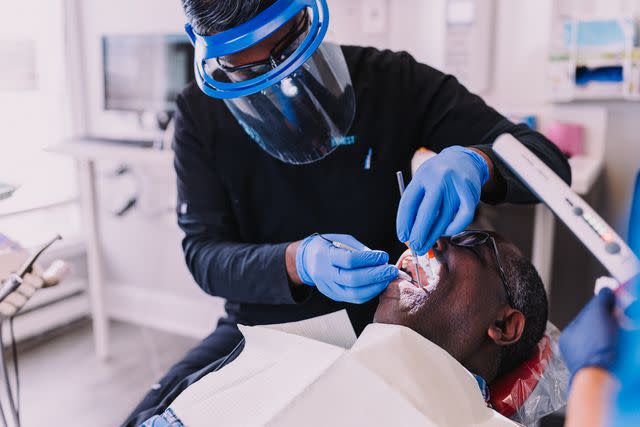Under Tongue Pain: Causes and What to Do
Medically reviewed by Brian T. Luong, DMD
Under tongue pain can be accompanied by swelling and may hurt more when moving the tongue. It may result from an injury to the tongue, infection, or an underlying condition. This article will discuss the different causes of pain on the underside of the tongue, treatment options, and when to see a healthcare provider.

Fly View Productions / Getty Images
How Under Tongue Pain Feels
The tongue is a muscular organ in the mouth that aids in digestion, taste, speech, and breathing. Due to its many uses, when someone experiences tongue pain, it can greatly affect their well-being. The pain can feel different from person to person and will depend on the cause of pain and location.
Under tongue pain may feel like:
Stinging
Burning
Soreness
Ache
Sharp pain
The pain can get worse when eating, drinking, or talking.
Common Causes of Under Tongue Pain
Under tongue pain is something many people have experienced. It is commonly caused by minor mouth injuries like eating food that is too hot or biting the inside of the mouth or tongue. Common causes include the following:
Canker sore: This can occur anywhere in the mouth or tongue. It is an open white or yellow area with the surrounding area appearing red. A virus, stress, or a mouth injury can bring it on.
Injury: Pain under the tongue can result from an injury like biting or an external trauma such as a blow to the face. This can cause swelling and pain.
Irritation: The inside of the mouth is prone to irritation from braces, dentures, or any other mouth appliances. When these rub or press against the area under the tongue, they can cause pain, swelling, and sores.
Glossitis: This term refers to swelling and inflammation of the tongue. It can make the tongue feel painful, sore, and tender. Glossitis can be caused by allergies, dry mouth, infection, or vitamin deficiencies.
Uncommon Causes of Under Tongue Pain
Some of the less commonly seen reasons someone may have under tongue pain include:
Ranula: This is a fluid-filled cyst that forms when a salivary gland is damaged and the saliva leaks into the surrounding tissue. It is generally found under the tongue and can cause pain and swelling.
Sialolithiasis: This is the formation of hardened minerals in the salivary glands, also known as salivary stones. When located under the tongue, they can cause pain and swelling. Experts are not certain what causes the stones, but some contributing factors include dehydration, smoking, and trauma inside the mouth.
Salivary gland tumor: In this condition, abnormal cells grow in the salivary ducts or glands. Most salivary gland tumors are benign. When the tumor is in one of the salivary glands under the tongue, it can cause pain and swelling.
Ludwig angina: This is an uncommon serious bacterial infection of the floor of the mouth, under the tongue. It most often develops after a tooth abscess or mouth injury. Rapid swelling of the area ensues, and its blockage of an airway constitutes a medical emergency.
Bumps or Sores Under the Tongue
Bumps or sores that appear under the tongue can be from canker sores or blocked salivary glands. They often go away on their own but may need medical attention if they get worse.
How to Treat Under Tongue Pain
Under tongue pain must be treated based on its underlying cause. It will often get better on its own or with conservative treatment such as over-the-counter pain relievers.
Glossitis (swelling of the tongue) has several different underlying causes. Contacting a healthcare provider is vital to determining the cause and finding the best treatment to resolve the swelling.
A blocked salivary gland caused by a tumor, salivary stone, or cyst must also be evaluated and treated by a healthcare provider.
When to Have a Dental Exam
Dental exams are recommended every six months. Having the gums, teeth, and mouth examined to ensure proper oral health can help.
Additional dental exams may be necessary when:
You have concerns about your mouth health.
You have sores or bumps in the mouth.
You have mouth pain.
You have swollen or red gums.
Summary
Under tongue pain is commonly caused by canker sores or irritation in the mouth. It will typically resolve on its own, but when symptoms do not get better or worsen, then it's time to contact a healthcare provider. Treatments will focus on the underlying cause and may include pain relievers.
Read the original article on Verywell Health.

